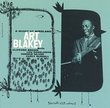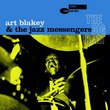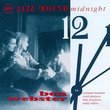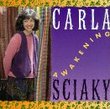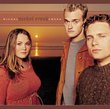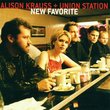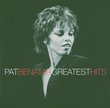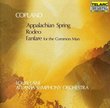| All Artists: Art Blakey, Thelonious Monk Title: Art Blakey's Jazz Messengers With Thelonious Monk Members Wishing: 2 Total Copies: 0 Label: Atlantic / Wea Release Date: 2/16/1999 Album Type: Extra tracks, Original recording remastered Genres: Jazz, Pop Styles: Modern Postbebop, Bebop Number of Discs: 1 SwapaCD Credits: 1 UPC: 081227559823 |
Search - Art Blakey, Thelonious Monk :: Art Blakey's Jazz Messengers With Thelonious Monk
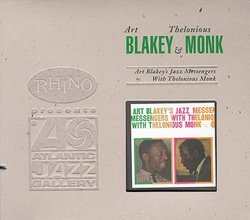 | Art Blakey, Thelonious Monk Art Blakey's Jazz Messengers With Thelonious Monk Genres: Jazz, Pop
In 1957 Thelonious Monk still lived at the edges of acceptance by a larger jazz audience, and Art Blakey's signature group was in the midst of a long formative phase. With Bill Hardman's cutting, raw-edged trumpet and John... more » |
Larger Image |
CD DetailsSynopsis
Amazon.com essential recording In 1957 Thelonious Monk still lived at the edges of acceptance by a larger jazz audience, and Art Blakey's signature group was in the midst of a long formative phase. With Bill Hardman's cutting, raw-edged trumpet and Johnny Griffin's gruff and coiling tenor, Blakey's band was a looser, less defined, but more intense unit than it would become later with in-house composers like Benny Golson, Bobby Timmons, and Wayne Shorter. When Blakey and Monk, longtime friends and associates, made this date playing some of Monk's core material, the Messengers became virtually a Monk ensemble and one of the most inspired to record. A year later, Griffin would be a regular member of Monk's quartet, and this disc demonstrates why. --Stuart Broomer Similar CDs
Similarly Requested CDs
|
CD ReviewsDissonant... Cedric Westphal | san francisco, ca | 09/18/2004 (2 out of 5 stars) "I am going to sound a different bell than the other reviewers here: while they rave about this album, I have to say I was rather annoyed. To me, Monk did not integrate with Blakey's band. They are playing in a quite straight up style, and he is in a very broken motifs mood. His style is very percussive here (short abrupt chords, with little continuity) and keeps running against the music the others weave around him. It sounded to me like a kid sabotaging the music. He is silent on the head out of 'evidence', or on the drums solo: those are the best parts. (and don't get me wrong: I love Monk, he's a genius and one of the greatest composers, it just did not fit here)." Blakey And Monk, A Great Pair!!!!!!!!!!!!!!!!!! Greatsch Guy | NEW YORK | 06/19/2004 (5 out of 5 stars) "It seems that every album Monk's on as a sideman has the same songs. You know, Blue Monk, Rhythm A Ning, Off Minor, Epistrophy, etc. But, they work in this album. Monk's style went good with Blakey behind him. I don't know why, but it does. I guess you just need that forcefull playing behind Monk. This wasn't the first time Blakey and Monk played together, but it sure was a good one!" Historically significant, but not quite the sum of its parts Michael Stack | North Chelmsford, MA USA | 01/26/2006 (3 out of 5 stars) "In the late spring of 1957, Thelonious Monk was invited to join Art Blakey's Jazz Messengers for an album largely of his compositions-- it was a productive time for Monk, a month after a guest spot with Sonny Rollins and the solo piano recording "Thelonious Himself" and a month before the sessions that would yield "Monk's Music". Blakey, for his part, was an established leader by this point, his Jazz Messengers revitalizing the New York bop scene and maintaining a busy recording schedule as a sideman, including sessions with Monk under the leadership of the pianist, Miles Davis, Gigi Gryce and Sonny Rollins. With Monk sitting at the piano chair in place of Sam Dockery, Blakey and the Messengers (tenorman Johnny Griffin, trumpeter Bill Hardman and bassist Spanky DeBrest), an added layer of tension would be added to the Jazz Messengers' sound.
Infusing Monk's music with a healthy dose of hardbop has an odd effect-- with the Jazz Messengers' proclivity towards blues and gospel sounds readily apparent, Monk sometimes sounds oddly out of place on his own compositions, particularly beneath Hardman, who he seems to have a limited rapport with. On the other hand, as Griffin rails away in exploratory fashion, Monk seems inclined to hold the theme close in his accompaniment. The net result-- regardless of the heavyweight billing of this record and the consistent praise levied upon it by everyone, it's a pretty mixed performance-- the five Monk pieces all get reasonable readings and at times are superlative (opener "Evidence" bristles with energy, "I Mean You" evokes gospel and stride traditions in a way quite unlike anything else) but at times, Blakey's vision seems to get in the way of the piece's strengths ("Rhythm-a-ning"). As a coda, a pretty much straight blues composed by Johnny Griffin finishes the record ("Purple Shades")-- it's a decent piece, but it feels like a coda. This reissue of this historic session is certainly a nice package-- the music is remastered and it sounds quite honestly like it was record in the past few years, not nearly (as I write this) 50 years ago. The record is augmented by three alternate takes as well. The album is a legendardy meeting, and it's one of the few sessions Monk participated in where his voice is not the dominant one-- this is Blakey's album through-and-through, but I've found both men to put forth more interesting work." |

 Track Listings (9) - Disc #1
Track Listings (9) - Disc #1